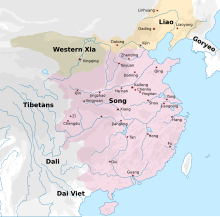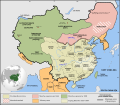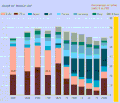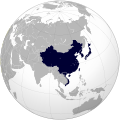Portal:Asia

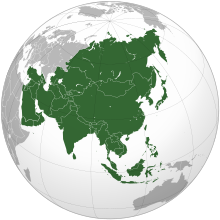 Asia (/ˈeɪʒə/ ⓘ AY-zhə, UK also /ˈeɪʃə/ AY-shə) is the largest continent in the world by both land area and population. It covers an area of more than 44 million square kilometers, about 30% of Earth's total land area and 8% of Earth's total surface area. The continent, which has long been home to the majority of the human population, was the site of many of the first civilizations. Its 4.7 billion people constitute roughly 60% of the world's population. Asia shares the landmass of Eurasia with Europe, and of Afro-Eurasia with both Europe and Africa. In general terms, it is bounded on the east by the Pacific Ocean, on the south by the Indian Ocean, and on the north by the Arctic Ocean. The border of Asia with Europe is a historical and cultural construct, as there is no clear physical and geographical separation between them. It is somewhat arbitrary and has moved since its first conception in classical antiquity. The division of Eurasia into two continents reflects East–West cultural, linguistic, and ethnic differences, some of which vary on a spectrum rather than with a sharp dividing line. A commonly accepted division places Asia to the east of the Suez Canal separating it from Africa; and to the east of the Turkish Straits, the Ural Mountains and Ural River, and to the south of the Caucasus Mountains and the Caspian and Black seas, separating it from Europe. China and India traded places as the largest economies in the world from 1 to 1800 CE. China was a major economic power for much of recorded history, with the highest GDP per capita until 1500. The Silk Road became the main east–west trading route in the Asian hinterlands while the Straits of Malacca stood as a major sea route. Asia has exhibited economic dynamism as well as robust population growth during the 20th century, but overall population growth has since fallen. Asia was the birthplace of most of the world's mainstream religions including Hinduism, Zoroastrianism, Judaism, Jainism, Buddhism, Confucianism, Taoism, Christianity, Islam, Sikhism, as well as many other religions. (Full article...) Featured articleThe Song dynasty (/sʊŋ/) was an imperial dynasty of China that ruled from 960 to 1279. The dynasty was founded by Emperor Taizu of Song, who usurped the throne of the Later Zhou dynasty and went on to conquer the rest of the Ten Kingdoms, ending the Five Dynasties and Ten Kingdoms period. The Song often came into conflict with the contemporaneous Liao, Western Xia and Jin dynasties in northern China. After retreating to southern China following attacks by the Jin dynasty, the Song was eventually conquered by the Mongol-led Yuan dynasty. The dynasty is divided into two periods: Northern Song and Southern Song. During the Northern Song (Chinese: 北宋; 960–1127), the capital was in the northern city of Bianjing (now Kaifeng) and the dynasty controlled most of what is now Eastern China. The Southern Song (Chinese: 南宋; 1127–1279) refers to the period after the Song lost control of its northern half to the Jurchen-led Jin dynasty in the Jin–Song Wars. At that time, the Song court retreated south of the Yangtze and established its capital at Lin'an (now Hangzhou). Although the Song dynasty had lost control of the traditional Chinese heartlands around the Yellow River, the Southern Song Empire contained a large population and productive agricultural land, sustaining a robust economy. In 1234, the Jin dynasty was conquered by the Mongols, who took control of northern China, maintaining uneasy relations with the Southern Song. Möngke Khan, the fourth Great Khan of the Mongol Empire, died in 1259 while besieging the mountain castle Diaoyucheng, Chongqing. His younger brother Kublai Khan was proclaimed the new Great Khan and in 1271 founded the Yuan dynasty. After two decades of sporadic warfare, Kublai Khan's armies conquered the Song dynasty in 1279 after defeating the Southern Song in the Battle of Yamen, and reunited China under the Yuan dynasty. (Full article...)Selected Country The United Arab Emirates (UAE), or simply the Emirates, is a country in West Asia, in the Middle East. Located at the eastern end of the Arabian Peninsula, it shares borders with Oman and Saudi Arabia; as well as maritime borders in the Persian Gulf with Qatar and Iran. The United Arab Emirates is an elective monarchy formed from a federation of seven emirates. , the UAE has an estimated population of 9.97 million. Emirati citizens are estimated to form 11.6% of the population; the remaining residents are expatriates, the majority of whom are South Asian. Islam is the official religion and Arabic is the official language. Abu Dhabi is the country's capital, while Dubai, the most populous city, is an international hub. The United Arab Emirates' oil and natural gas reserves are the world's sixth and seventh-largest, respectively. Zayed bin Sultan Al Nahyan, ruler of Abu Dhabi and the country's first president, oversaw the development of the Emirates by investing oil revenues into healthcare, education, and infrastructure. The country has the most diversified economy among the members of the Gulf Cooperation Council. In the 21st century, the UAE has become less reliant on oil and gas and is economically focusing on tourism and business. The UAE is considered a middle power. It is a member of the United Nations, Arab League, Organisation of Islamic Cooperation, OPEC, Non-Aligned Movement, World Trade Organization, Gulf Cooperation Council (GCC) and BRICS. The UAE is also a dialogue partner of the Shanghai Cooperation Organisation. (Full article...)Featured biographyChan Kong-sang SBS MBE PMW (born 7 April 1954), known professionally as Jackie Chan, is a Hong Kong actor, director, writer, producer, martial artist, and stuntman known for his slapstick acrobatic fighting style, comic timing, and innovative stunts, which he typically performs himself. Before entering the film industry, he was one of the Seven Little Fortunes from the China Drama Academy at the Peking Opera School, where he studied acrobatics, martial arts, and acting. Chan has been acting since the 1960s, performing in more than 150 films. He is one of the most influential action film stars of all time. After appearing in many Hong Kong films as a stuntman, Chan's first major breakthrough was the 1978 kung fu action comedy film Snake in the Eagle's Shadow. He then starred in similar kung fu action comedy films such as 1978's Drunken Master and 1980's The Young Master. In 1979, he made his directorial debut with The Fearless Hyena, which was a box office success. 1983's Project A saw the official formation of the Jackie Chan Stunt Team and established Chan's signature style of elaborate, dangerous stunts combined with martial arts and slapstick humor, a style he further developed in a more modern setting with 1984's Wheels on Meals and 1985's Police Story. Rumble in the Bronx (1995), which had a successful worldwide theatrical run, brought Chan into the North American mainstream, leading to a successful Hollywood career with the Rush Hour and Shanghai series. In 2010, Chan appeared in his first dramatic role in an American film, The Karate Kid. (Full article...)General imagesThe following are images from various Asia-related articles on Wikipedia. Featured picture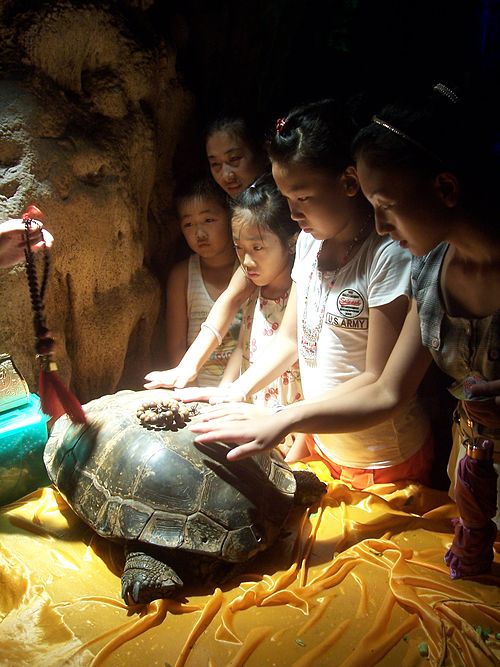 Credit: Paul Munhoven In the grotto of the flute reeds, China, a family shows reverence for an ancient turtle. The turtle is a symbol of longevity throughout many parts of Asia. Its four feet represent the four corners of the earth, its endurance is considered to last 10,000 years. A symbol of good luck and long life, many turtles are pushed towards extinction by consumption in Chinese medicine.
Did you know...
Updated: 6:33, 14 February 2024 In the news
Related portalsMajor Religions in Asia Middle East Central Asia and Surroundings Indian Subcontinent Southeast Asia East Asia Selected panorama
Birds and flowers of the four seasons (紙本墨画花鳥図, shihon bokuga kachōzu), part of the Paintings on room partitions in the abbot's quarters (hōjō) (方丈障壁画, hōjō shōhekiga) of Jukō-in (聚光院) of Daitoku-ji (大徳寺), Kyoto, Japan. Ink on paper. This picture shows four of 16 panels on fusuma (sliding doors) in the ritual room (室中). The paintings have been designated as National Treasures of Japan in the category paintings. TopicsCategoriesAssociated WikimediaThe following Wikimedia Foundation sister projects provide more on this subject:
More portalsShortcuts to this page: Asia portal • P:ASIA Purge server cache |

